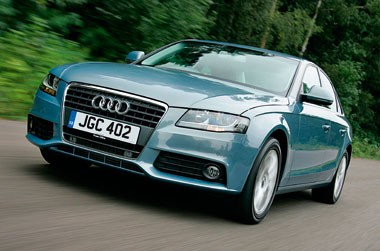Review
Lowering emissions and running costs is the holy grail of manufacturers and fleet operators.
And at first glance the latest engine to be added to Audi’s Fleet News Award-winning A4 range looks to tick both these boxes. The 120bhp 2.0 TDI model lowers the price level, cuts CO2 emissions and improves economy.
Essentially a detuned version of the 143bhp common rail 2.0 TDI unit, the new engine reduces CO2 emissions from 139 to 134g/km and raises claimed combined fuel economy from 53.3 to 55.4mpg.
However, despite the improvement in emissions, the lower powered engine still sits in the same 18% benefit-in-kind tax band for drivers.
Comparing the 2.0 TDI 120 and 2.0 TDI 143, both in SE trim, reveals that the 120bhp model will cost a 40% taxpayer £1 a month less in BIK. The fact that the higher powered version costs just £685 more at the front-end has much to do with this.
However, the 120bhp version does come through with lower running costs, offering a 1.1 pence per mile advantage over four years and 80,000 miles than the 143bhp model thanks to lower levels of depreciation (both retain 29% of cost new after four years/80,000 miles, but the TDI 120 loses £485 less thanks to its lower front-end price).
But with such small differences, it makes the case for the TDI 120 look less strong. This engine will account of 12% of A4 TDI sales, with the TDI 143 the majority.
While outwardly there are no styling or badging differences between the two models, on the road you can feel the decrease in power.
It’s still a far from unpleasant car to drive, and the interior remains one of the best on the market, but that lack of low-down torque that you become accustomed to in diesels in not as apparant in the TDI 120.
As a result, you tend to hold on to gears longer and be heavier with the throttle to make progress, whereas in the TDI 143 you can change up early as the on-board change sign tells you to do, and still have decent
acceleration.
For the sake of the small advances that this new engine brings, the more powerful and all-round better to drive 2.0 TDI 143 version remains the pick of the A4 TDI bunch.
Fleet view
“We have 178 A4s. The A4 is a quality product that is affordable for the employee. We have no major concerns on reliability, supply or service.”
Martin Lock, fleet support manager,
British Gas
Rivals
- BMW 318d ES
- Mercedes-Benz C200 CDI SE
- Volkswagen Passat CC 2.0 TDI GT
P11d price
Fully-loaded Passat looks good value, and has more power than the Audi and Mercedes.
1. Passat £22,671
2. A4 £23,040
3. C200 £23,700
4. 318d £24,060
Emissions and tax
A 40% tax-payer’s BIK bill will be £138 a month in the A4 – BMW £144, VW £151, C200 £158.
1. 318d 123g/km/18%
2. A4 134g/km/18%
3. Passat 146g/km/20%
4. C200 149g/km/20%
Fuel costs
BMW returns 60.1mpg combined. A4 offers 55.4, Passat 48.7 and Mercedes 47.9mpg average.
1. 318d 7.79/£4,674
2. A4 8.46/£5,076
3. Passat 9.62/£5,772
4. C200 9.95/£5,970
Wholelife costs
BMW leads the way with lowest fuel and SMR bills. Strong RV helps A4 to second place.
1. 318d 34.12/£20,472
2. A4 35.32/£21,192
3. Passat 35.78/£21,468
4. C200 36.23/£21,73
Leasing rates
Lowest monthly rental with maintenance from www.comparecontracthire.com (excluding VAT).
1. 318d £361 (Days)
2. C200 £398 (Arval)
3. Passat £403 (TCH)
4. A4 £406 (Arval)
Verdict
Over four years and 80,000 miles the BMW is the cheapest to run, undercutting the Audi by £720. The BMW also offers the cheapest monthly leasing rate and the lowest CO2 emissions, although the Audi’s lower P11D price brings lower BIK bills. Factor it in that it offers the best drive of the four and it is the winner.
Winner: BMW 318d ES
















